#i didn't explicitly make this post about tsukishima/koito the ship
Explore tagged Tumblr posts
Text
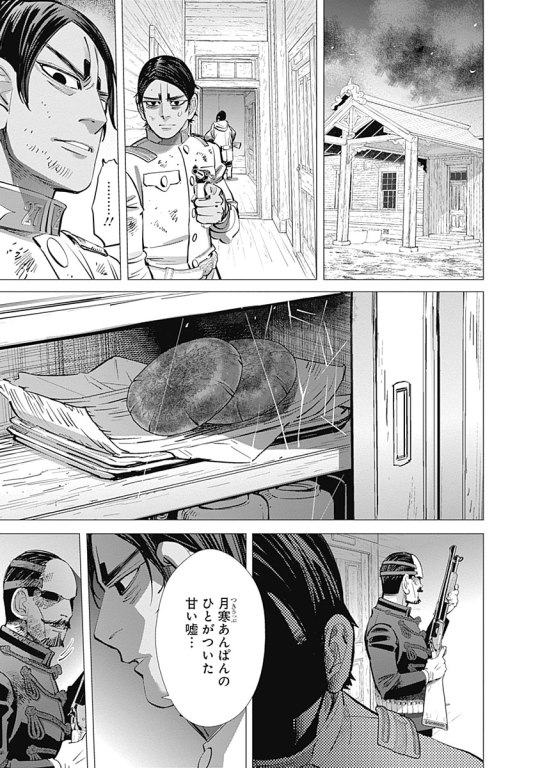
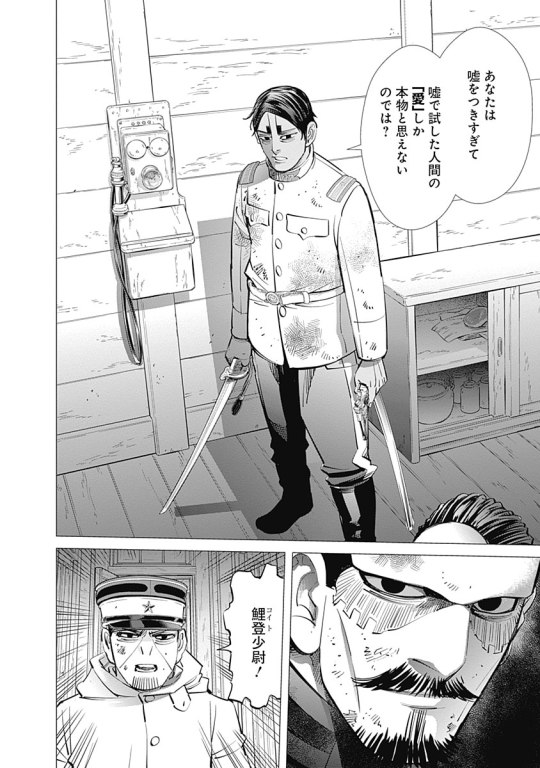
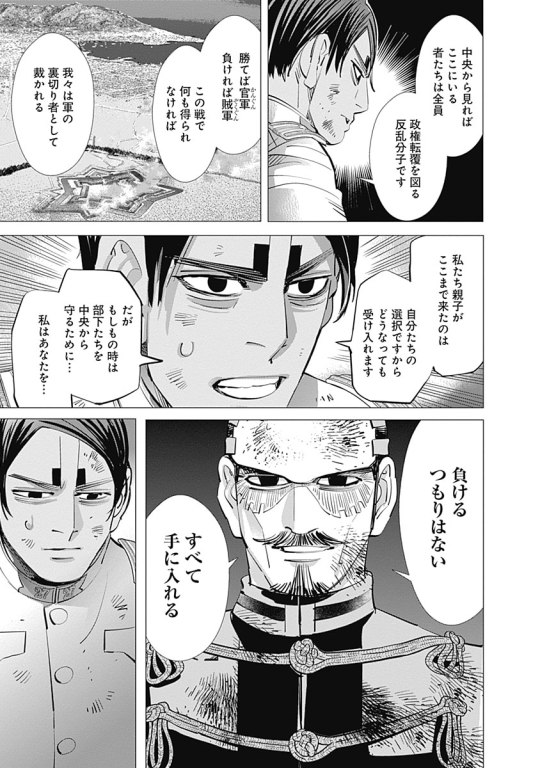
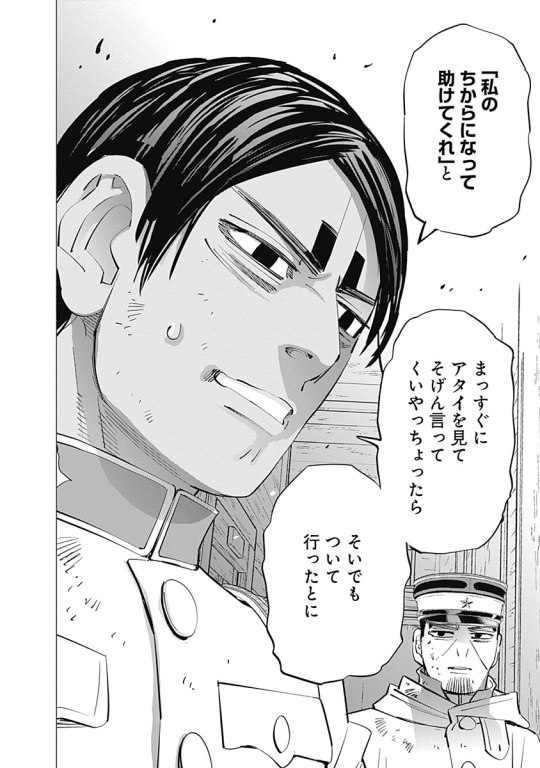

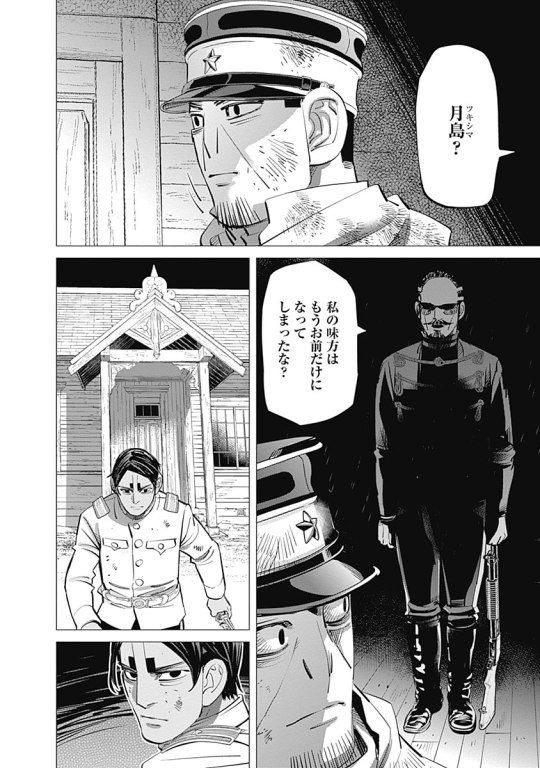
this important scene between koito, tsurumi, and tsukishima at goryokaku (chapter 295) was greatly changed in golden kamuy volume 30. the volume version is above. i decided to translate and then analyze it.
EH scans translated the magazine version of the manga as it was being released, so they haven't done this version, to my knowledge. and VIZ hasn't gotten this far in their official translation yet. so neither of my main sources have done it! that's why i'm translating these pages. i don't know if anyone else has translated this. if someone has, then you can look at their translation AND mine and compare them if you want. (and you can send me a link to their version.)
i want to show you the magazine version for comparison. this is the translation by EH scans:



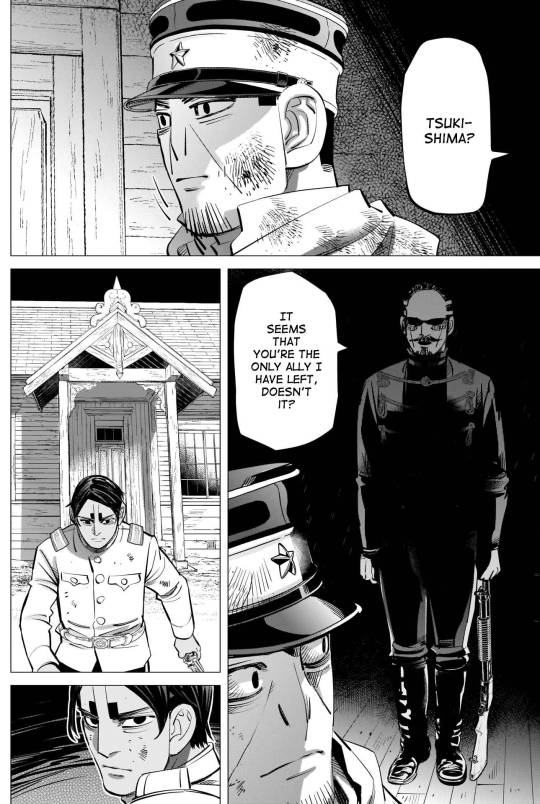
you'll notice that the page count increased by two for the volume version. you'll also notice that the first and last pages haven't changed at all; i only included them for context because that's the whole scene.
while reading the raw manga, i had intended to check on one of the lines in this scene to see what it said in japanese and compare the translation. the line in question was the one where tsurumi talks about entrusting things to splendid koito. but that line is completely obliterated in the volume version, and i can't find the raw magazine version of this particular chapter, so i'll forget about that forever i guess. it doesn't matter because it's not canon anymore.
now, because i love koito and tsukishima so much, i went to the trouble of typesetting these pages with my own translation. so i'll include them here for your reading pleasure, and THEN i'll go ahead with the inevitable overanalysis in terms of translation and plot significance.



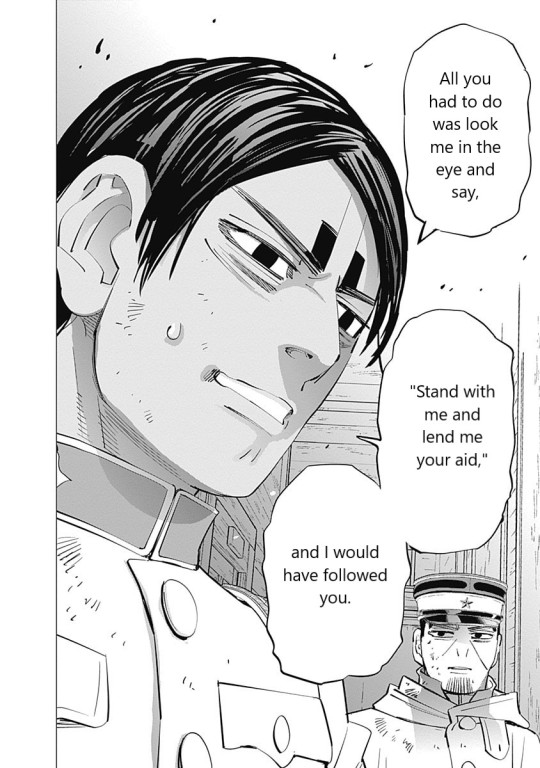
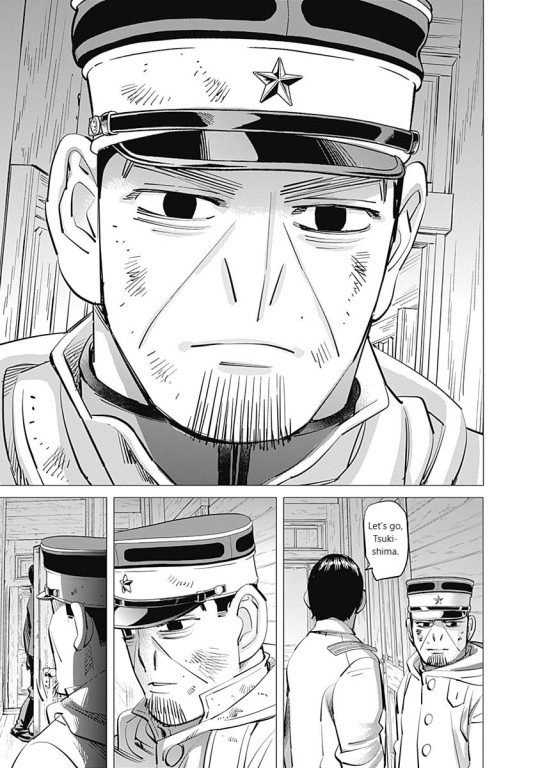
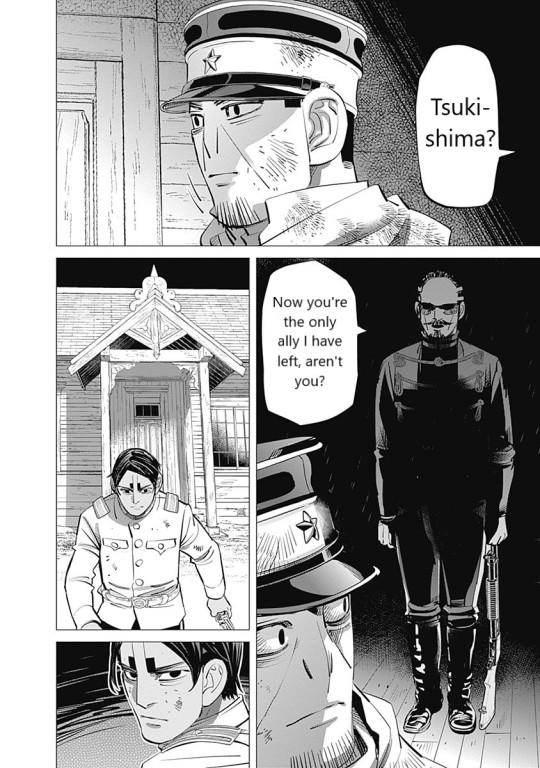
(i typeset it clumsily and also committed the vile typesetting sin of not using an all-caps font. but paint 3d didn't have any all-caps fonts, okay?? i'm very lazy! i'm not gonna go download a font just for this. also i didn't really need to do the first and last pages here because nothing changed and EH scans translated it just fine, but for the sake of completionism, i did them anyway.)
so that's my translation, and you can just read that and walk away if you want. but i'll write a lot more anyway.
line by line translation notes
in order of speech bubble, by page. a slash / indicates a split in a compound speech bubble. a double slash // indicates two separate speech bubbles in one entry. transliterations are rough and not based on any real standard of romaji.
PAGE 1
raw: 月寒あんぱんのひとがついた甘い嘘… transliteration: tsukisappu anpan no hito ga tsuita amai uso… EH scans translation: The tsukisappu anpan person ended up telling sweet lies... my translation: The sweet lies that the Tsukisappu anpan person told... notes: it's a sentence fragment. it makes you think there's going to be a second part to the sentence, but there's not. because there's not, to avoid confusing the reader, EH scans turned it into a full sentence. that's fair. my translation is more literal, so i didn't turn it into a full sentence, but it doesn't sound as good... i guess i didn't need to retranslate this one if it doesn't sound any better... let's move along.
PAGE 2
raw: あなたは嘘をつきすぎて / 嘘で試���た人間の「愛」しか本物と思えないのでは? transliteration: anata ha uso wo tsukisugite / uso de tameshita ningen no [ai] shika honmono to omoenai no de ha? my translation: Haven't you lied so much / that you can only believe someone's [love] is real after you've tested them with lies? notes: "love" here is "ai" 愛. it's the same love that tsurumi talks about with his judo teacher when he talks about inspiring love among his soldiers so they will actually kill instead of pretending to kill. it is not "koi" 恋 romantic love, but it is love in the broadest sense.
raw: 鯉登少尉! transliteration: koito shoui! my translation: Second Lieutenant Koito! notes: no translation notes, but tsukishima's face did get slightly altered, and the speech bubble has wavery edges now, and dramatic motion lines were added. it's an emotional exclamation!!!
PAGE 3
raw: 中央から見ればここにいる者たちは全員 / 政権転覆を図る反乱分子です transliteration: chuuou kara mireba koko ni iru monotachi ha zen'in / seiken tenpuku wo hakaru hanran bunshi desu my translation: From Central's point of view, all of the people here / are insurgents plotting to overthrow the government. notes: seiken "political administration," tenpuku "overturn/overthrow," hakaru "to plan, to plot, to strive for," hanran "insurrection, rebellion," bunshi "member(s), element(s)." this isn't the first time we've heard the phrase "hanran bunshi." in chapter 78 (volume 8), shortly after tsukishima kicks him and then yells at him for killing maeyama, ogata uses the phrase to describe tsurumi's men. i think a fair translation of "hanran bunshi" would be "rebel faction."
raw: 勝てば官軍負ければ賊軍 / この戦でなにも得られなければ transliteration: kateba kangun makereba zokugun / kono ikusa de nanimo erarenakereba my translation: If you win, you're in the right. If you lose, you're in the wrong. / If we gain nothing from this battle… notes: the first line must be an existing saying, because when i searched zokugun on jisho.org, it brought up that first sentence word for word as one of its example sentences. so i made that the translation, word for word... you know, cos it's an existing saying... plus it's nice and concise...
raw: 我々は軍の裏切り者として裁かれる transliteration: wareware ha gun no uragirimono toshite sabakareru my translation: …we will be judged as traitors to the military.
raw: 私たち親子がここまで来たのは / 自分たちの選択ですからどうなっても受け入れます transliteration: watashitachi oyako ga koko made kita no ha / jibuntachi no sentaku desukara dounattemo ukeiremasu EH scans translation: The fact that my father and I have come this far… / That was the choice we ourselves made, so I can accept whatever comes of it. my translation: My father and I have come this far by choice. / Whatever happens, we will accept it. notes: i learned the word sentaku 選択, meaning "choice, option." it is different from sentaku 洗濯, meaning "laundry." also it seems that this line was not changed in the volume version; it was only moved around. that's why there's an EH scans translation for this entry. i would say their translation is slightly more accurate, but i'm happy with the concise way i phrased it.
raw: だがもしもの時は部下たちを中央から守るために… / 私はあなたを… transliteration: daga moshimo no toki ha bukatachi wo chuuou kara mamoru tame ni… / watashi ha anata wo… my translation: But if circumstance demands it, in order to protect my subordinates from Central… / I will … notes: "moshimo no toki" refers to unexpected circumstances. moshimo = what if, toki = time, so it's a "what if time." you could translate it as "if anything happens," and i was about to, but i had already used the word "happens" in the last speech bubble and i didn't want it to echo. so i took a liberty and made it sound cooler. as for the second half of the speech bubble, the literal translation is "i will ... you" and the verb is left unsaid. you can imagine the verb implied would be either "stop" or "kill." this is the pain of translation from SOV word order to SVO word order. also, there were very similar lines in the EH scans version, but because they didn't match precisely and i haven't seen the raws they were translating from, i couldn't be sure that the lines were exactly the same. so i didn't include EH scans's translation in this entry.
raw: 負けるつもりはない // すべて手に入れる transliteration: makeru tsumori ha nai // subete te ni haireru my translation: I do not intend to lose. // We will obtain everything we seek. notes: note that this is 100% different from the previous version where tsurumi tells koito to kill him. he just flat-out doesn't say that anymore. the first speech bubble is easy to translate. the second one isn't, or rather, it's hard to make it sound good? subete = everything, te ni haireru = to obtain. i took a minor liberty by making it a "we" pronoun because i think tsurumi would emphasize that his goals are for everyone's sake, not just his own. and i added "we seek" for clarity. also it sounds cooler.
PAGE 4
on this page, i changed the order of the contents of the speech bubbles to make it more of a cohesive sentence in english.
raw: 「私のちからになって助けてくれ」と // まっすぐにアタイを見てそげん言ってくいやっちょったら / そいでもついて行ったとに transliteration: [watashi no chikara ni natte tasukete kure] to // massugu ni atai wo mite sogen itte kuiyacchottara / soidemo tsuite itta toni my translation: All you had to do was look me in the eye and say, // [Stand with me and lend me your aid,] / and I would have followed you. notes: most prominent note is that koito lapses completely into satsuma dialect for the parts of the line that aren't in brackets. it isn't played as a joke this time; he is not speaking rapidly. tsurumi was able to understand him speaking like this when they first met, and he can understand him now. he says the bracketed part as what he wishes tsurumi would have said to him, and then he says the rest in dialect. "chikara ni naru" = "to be helpful, to be dependable, to stand by (someone)." if taken literally, "chikara ni naru" would mean "become my strength." but to my understanding, it does not have nearly the same intense connotations as the phrase "become my strength" does in english. i think. so that's the part i translated as "stand with me." then, "tasukete kure" means "help me, save me, assist me, support me." gotta figure out which verb makes the most sense in context. it's in the context of joining his team in a military sense, so it implies in the long term, and i think a phrase with a similar feeling that implies a longer term than "help" would be "lend me your aid." so that's how i arrived at "Stand with me and lend me your aid." this is a super important line; i'll write more about its significance down below. one more translation note: he says "massugu ni" (straightforward, frank, honest) with the verb "miru" (look at). so he's saying to "look at me straightforwardly." i phrased it as "look me in the eye" because that's what you do when you're looking at someone straightforwardly. honesty is the important implication (in contrast to sweet lies).
PAGE 5
raw: いくぞ月島 transliteration: ikuzo tsukishima EH scans translation: Let's go, Tsukishima. my translation: Let's go, Tsukishima. notes: could've also phrased it like, "We're leaving, Tsukishima." i have a feeling this line just slipped out of koito's mouth without any thoughts attached to it.
PAGE 6
raw: 月島? // 私の味方はもうお前だけになってしまったな? transliteration: tsukishima? // watashi no mikata ha mou omae dake ni natte shimatta na? EH scans translation: Tsukishima? // It seems you're the only ally I have left, doesn't it? my translation: Tsukishima? // Now you're the only ally I have left, aren't you? notes: tsurumi's use of "shimatta" carries the implication that this is how things have "ended up." a very literal translation could be, "my allies have now ended up becoming only you, huh?" but of course that doesn't sound natural, so it must be finagled. anyway, probably EH scans' version is better than mine. i just wanted to shed a little light on how you can translate the same sentence different ways and both can be right because japanese grammar is so different that there is no single direct counterpart.
plot analysis notes
i think it goes without saying that the changes to this scene are pretty significant in terms of the plot. some reasons are as follows:
when tsukishima calls out to koito in distress (page 2, second panel), it comes after a different line in this version. in the old version, he interrupts a line about koito and his father having come this far. there's not much significance to that except that he was maybe trying to stop koito from saying too much. but in this version, tsukishima cries out after koito's line about testing people with sweet lies. koito has come out and said too much right away. tsukishima is more upset this time because confronting tsurumi about sweet lies would reveal that tsukishima had talked to koito and given away the fact that the kidnapping was a ruse. tsukishima is distressed because he doesn't want tsurumi to think that he is turning on him as well.
new lines show that koito does understand the nature of tsurumi's rebellion against central. honestly it was kind of up in the air before this, given koito's earnest nature and the fact that his high-ranking father would have had to be in on it too. but now we know for sure that he understands. it's easy to look down on koito because he's so naive and emotional, but he's not stupid.
by changing this scene, noda-sensei makes the most of this confrontation, which is koito's last chance to have a calm conversation with tsurumi. (the only confrontation they have after this is when koito yells up at tsurumi on top of the train and tells him to set tsukishima free. but the subject matter is completely different at that time, and the tension is much higher, so that would be no time to bring up sweet lies again.) in terms of wrapping up the unresolved conflict of the kidnapping incident, it's gotta be this scene or nothing. in the altered scene, koito can now say what he wants to say to tsurumi about the kidnapping, make it clear he knows it was a lie, and gauge how tsurumi responds.
tsurumi no longer taunts koito (saying "kill me" when they both know he won't; implying that he would trust koito to carry on his plans because he's just that splendid when they both know he can't). those lines are tossed in the garbage and don't exist anymore. what he now says is short and simple, and it avoids the heart of the matter completely; he ignores 95% of what koito said and only focuses on one aspect (what might happen if they fail). koito hears this bad-faith response and understands that tsurumi will not voluntarily come clean about his lies. that's why he says his emotional next line and leaves it at that.
the line "Stand with me and lend me your aid" (「私のちからになって助けてくれ」) is a very important addition to this scene!!! the reason is that it is the line that koito says to tsukishima in the final chapter! (i haven't gotten there in the raw manga yet, but i've seen it A Lot in japanese fanart, so i recognized it right away.) that later line becomes a callback to this moment! i had no idea! if you had read the magazine version only (and i think we english language readers are all in the same boat in that respect), then you wouldn't have had the full context of that line in the final chapter. it is more satisfying and makes much more sense this way. and this line carries so much weight in both scenes. koito wishes that tsurumi would have earnestly asked for his help instead of tricking him with sweet lies. then, in the final chapter, koito earnestly asks tsukishima to join him by using that same line! it's a complete rejection of tsurumi's "sweet lies" modus operandi! there doesn't need to be any pretense between the two of them! they can just rely on each other honestly and with their whole hearts! (note: EH scans translated that line in the final chapter as, "Lend me your strength. I require your aid." that's good. i like mine better. maybe someone else could translate it even better. i really don't think VIZ will, though.)
tsukishima has an emotional reaction when koito says that. we get a whole new big panel of his face, so that's our cue to think about how tsukishima must feel at that moment. he looks surprised and thoughtful. i think he is impressed by koito's resolve and frankness and the way he made himself vulnerable in that moment by speaking his mind (in his native dialect). he must also be thinking about how this means that the whole kidnapping scheme was a waste of time and caused pain (and cost lives) for no reason. and he's probably thinking about how nice it would have been if tsurumi had said something like that to him instead of trapping him with sweet lies as well. it's a moment where tsukishima is struck by how koito is honest and honorable, and it stands in stark contrast to tsurumi (especially considering the monster that tsurumi has become). this moment helps us better understand why tsukishima sticks with koito at the end of the story.
the following was clear in the other version too, but when koito says it's time to go, tsukishima is clearly turning to follow him (he turns 180 degrees right in front of us). that's notable. first of all, i don't think koito said that and expected tsukishima to follow him in a "you better choose me or him right now!" kind of way. i think it slipped out. tsukishima has become a staple in his life, and he expects him to be at his side at all times, so he tried to walk away with him out of habit without considering what it would look like to tsurumi. on a similar note, i don't think tsukishima was about to follow koito in a "now we're turning our backs on tsurumi forever" kind of way. it was a kind of subconscious movement; he found himself turning to follow the person he really wanted to follow. and there are motion lines showing that he stops moving when tsurumi calls out to him. if tsurumi hadn't stopped him, i wonder how far he would have gotten before catching himself and thinking about how it would look to tsurumi if he followed koito out of the building.
it seems that that after this scene, koito isn't exactly working toward tsurumi's goals anymore. in the last panel of the last page here, he notices tsukishima isn't following him. that's probably when he thinks about the implications of trying to take tsukishima with him, so he goes off by himself. the next time we see him, he confronts fleeing shiraishi and fights nagakura on the bridge. but why is he doing that? maybe because he thinks tsurumi getting the land deed would be better for japan than if team hijikata kept it. it can't be blind allegiance to tsurumi at this point, right? and then a little later (after jumping in the moat), koito sees tsukishima riding away with tsurumi on horseback, so he follows them and ends up at the train. why does koito board the train and fight hijikata? is it still in pursuit of tsurumi's goals? or is it to protect his subordinates on the train, especially tsukishima? it has to be the latter, right? he doesn't do anything explicitly rebellious, but his allegiance to tsurumi is basically gone at that point, and that's why he is able to confront tsurumi in tsukishima's defense on the back of the train car. so in essence, the scene in this post was the final turning point in the relationship between koito and tsurumi. his goal has become "protecting his subordinates (especially tsukishima) from being sacrified by tsurumi."
in conclusion, i kinda wish noda-sensei wouldn't make sweeping changes to art AND dialogue in very important scenes... but i think this change was pretty good.
EDIT: i found out that piduai also translated these pages, and they ended up with a very similar translation to mine for that one important line! yeahh! i've discovered the MVP piduai! i encourage you to compare the translations.
#golden kamuy#golden kamuy translation notes#koito otonoshin#tsukishima hajime#golden kamuy spoilers#SPOILERS UP TO THE END OF THE FINAL CHAPTER OF GOLDEN KAMUY#translating and typesetting and reposting 6 whole pages of manga falls under fair use if you surround it with a big honking essay right#i didn't explicitly make this post about tsukishima/koito the ship#but rest assured that the underlying implication of everything i've written here is that they love each other#i was like ''good this post doesn't mention ogata even once. my honor is restored'' but shit it does mention ogata once. fuck#(gripping desk) IS IT NORMAL TO POST SOMETHING LONG LIKE THIS ON CHRISTMAS EVE? IS IT NORMAL OR IS IT WEIRD? IT'S NORMAL RIGHT?
138 notes
·
View notes